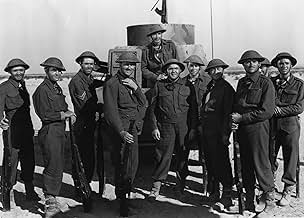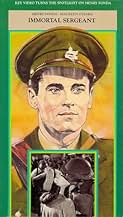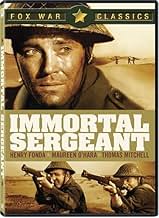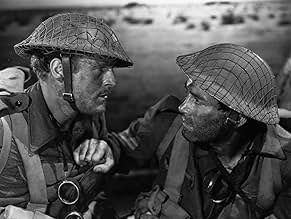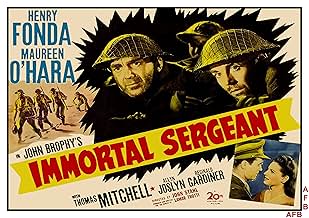IMDb-BEWERTUNG
6,6/10
1109
IHRE BEWERTUNG
Füge eine Handlung in deiner Sprache hinzuDuring a WW2 patrol in the North-African desert, a Canadian corporal reminisces about his sweetheart and must lead his platoon when the sergeant gets wounded.During a WW2 patrol in the North-African desert, a Canadian corporal reminisces about his sweetheart and must lead his platoon when the sergeant gets wounded.During a WW2 patrol in the North-African desert, a Canadian corporal reminisces about his sweetheart and must lead his platoon when the sergeant gets wounded.
- Regie
- Drehbuch
- Hauptbesetzung
- Auszeichnungen
- 3 wins total
John Banner
- Officer
- (Nicht genannt)
Wilson Benge
- Waiter
- (Nicht genannt)
Ted Billings
- Man at Train Depot as Soldiers Return
- (Nicht genannt)
Lane Bradford
- Returning Soldier
- (Nicht genannt)
James Carlisle
- Party Guest
- (Nicht genannt)
Gordon B. Clarke
- Soldier
- (Nicht genannt)
Ruth Clifford
- Nightclub Patron
- (Nicht genannt)
James Craven
- NCO
- (Nicht genannt)
Oliver Cross
- Nightclub Patron
- (Nicht genannt)
Jack Deery
- Party Guest
- (Nicht genannt)
Empfohlene Bewertungen
1943's The Immortal Sergeant is a tedious and overly melodramatic bit of dullness that makes you glad we won WWII. But how?
I never got a chance to suspend my disbelief with this movie. Every moment I saw characters running hither and yon, pursuing Nazis or being strafed, I reacted with a dull, throbbing irritation. The movie is so drab that whatever does get done right gets lost in the wrong.
Henry Fonda, the young Canadian soldier in the Royal Army, is such a wussburger, he's willing to let Maureen O'Hara go to a teddibly uppa-crust war correspondent (Allyn Joslyn) instead of popping him in the nose. He whines to his sergeant (the immortal one--Thomas Sullivan) that he can't have a rank of responsibility. When he takes over the patrol, he has to quell a mutiny, slaughter a bunch of Italians and Germans, and make it back to base, all the while being crippled by some of the most boring flashbacks I've ever seen.
By the time our hero gets a medal pinned on his hospital robe (yeah, he makes it), he has turned in to a nasty, kill-em-all-and-let-God- sort-them-out candidate for a commission. He tells the teddible war correspondent that if he doesn't get a letter to O'Hara telling her he wants to marry her, he'll murder the journalist friend.
Sheesh, not "I'll smack ya in the kisser" or "I'll dance on your head, but "I'll murder you."
So much for Mr. Nice Wussburger. I think I liked him better.
The Immortal Sergeant didn't teach that to Corporal Jackass.
I never got a chance to suspend my disbelief with this movie. Every moment I saw characters running hither and yon, pursuing Nazis or being strafed, I reacted with a dull, throbbing irritation. The movie is so drab that whatever does get done right gets lost in the wrong.
Henry Fonda, the young Canadian soldier in the Royal Army, is such a wussburger, he's willing to let Maureen O'Hara go to a teddibly uppa-crust war correspondent (Allyn Joslyn) instead of popping him in the nose. He whines to his sergeant (the immortal one--Thomas Sullivan) that he can't have a rank of responsibility. When he takes over the patrol, he has to quell a mutiny, slaughter a bunch of Italians and Germans, and make it back to base, all the while being crippled by some of the most boring flashbacks I've ever seen.
By the time our hero gets a medal pinned on his hospital robe (yeah, he makes it), he has turned in to a nasty, kill-em-all-and-let-God- sort-them-out candidate for a commission. He tells the teddible war correspondent that if he doesn't get a letter to O'Hara telling her he wants to marry her, he'll murder the journalist friend.
Sheesh, not "I'll smack ya in the kisser" or "I'll dance on your head, but "I'll murder you."
So much for Mr. Nice Wussburger. I think I liked him better.
The Immortal Sergeant didn't teach that to Corporal Jackass.
"Immortal Sergeant" was apparently not one of Henry Fonda's favorite film roles. I am not sure why "The Big Street" wasn't his least favorite (it was god-awful, believe me) but he disliked it. And, I might add, my wife wasn't super-fond a this film as we watched it. However, I really thought it was pretty good...though I do wonder if the main character played by Fonda might have been schizophrenic--that's because throughout the film he keeps hearing the voice of his sergeant--even though the guy is dead!
The film is a WWII propaganda film. Because of this, it's main thrust is NOT realism but to bolster folks' support of the war effort. I cut the film a bit of slack, as it was 1943 and keeping up morale was a major concern. What I didn't like was the casting of Fonda, as he was supposed to be a Brit--and seemed about as British as John Wayne or Hattie McDaniel! In this sense, I could see why he didn't like playing this role--but the plot is pretty good and more than makes up for this.
The sergeant in the title is played by Thomas Mitchell--and he's very good in this role. This guy is a career soldier and seems indestructible to his men--and he is adored by them. However, although he seems to have all the answers, his corporal (Fonda) seems quite different--unsure of himself and not at all the soldier Mitchell is. But, when the sergeant is killed and Fonda is left in charge of a small group of men in the North African desert, he's given a chance to show his mettle.
In many ways, this film is a lot like the film "Sahara"--though "Sahara" is a much more enjoyable (and less realistic) film. Both are set in the same locale and are about a small group of soldiers overcoming greater numbers of enemy soldiers. But the casting and script just weren't quite as good here--though the film STILL is enjoyable and did what the studio wanted it to do. I also appreciate how the men in this film were NOT indestructible--many died even though you KNEW how it all had to end. Not brilliant but quite entertaining.
The film is a WWII propaganda film. Because of this, it's main thrust is NOT realism but to bolster folks' support of the war effort. I cut the film a bit of slack, as it was 1943 and keeping up morale was a major concern. What I didn't like was the casting of Fonda, as he was supposed to be a Brit--and seemed about as British as John Wayne or Hattie McDaniel! In this sense, I could see why he didn't like playing this role--but the plot is pretty good and more than makes up for this.
The sergeant in the title is played by Thomas Mitchell--and he's very good in this role. This guy is a career soldier and seems indestructible to his men--and he is adored by them. However, although he seems to have all the answers, his corporal (Fonda) seems quite different--unsure of himself and not at all the soldier Mitchell is. But, when the sergeant is killed and Fonda is left in charge of a small group of men in the North African desert, he's given a chance to show his mettle.
In many ways, this film is a lot like the film "Sahara"--though "Sahara" is a much more enjoyable (and less realistic) film. Both are set in the same locale and are about a small group of soldiers overcoming greater numbers of enemy soldiers. But the casting and script just weren't quite as good here--though the film STILL is enjoyable and did what the studio wanted it to do. I also appreciate how the men in this film were NOT indestructible--many died even though you KNEW how it all had to end. Not brilliant but quite entertaining.
It is not as good as "An Ice Cold in Alex" but next to it. It's the same kind of desperately desolate desert with no hope, no water, only the constant peril of the Germans, all lives constantly at stake, and some occasional actual fights. Most of the action takes place in the night, so you don't see much of the arid landscape, fortunately, and there are some moments of relief. The acting is superb by everyone, Thomas Mitchell above all as the sergeant, and Henry Fonda, as the corporal, while Maureen O'Hara sparkles in all her beauty only in flashbacks. These flashbacks actually constitute the main cinematic attraction of the film, because they show the ideal life dreamed about in times of wine and roses from the utter darkness of the abyss of the desperate war situation. It's a Great War film, and the last film Henry Fonda made before enlisting for the war himself.
Some films age well, while others get noticeably worse over the years. This film falls into the second category. First, we are asked to believe that Henry Fonda is British; please. Then, we have to subjected to Thomas Mitchell, one of the worst character actors in the history of film. He always played a mischievous Irishman; how creative.
Fonda is always good; regardless of his vehicles in film and Sullivan is believable (but not as a Brit).
The production crew made a few mistakes; like the desert being sweaty at night; it is cool in the desert at night, and unbearingly hot in the day.
This leads to a few other holes in the plot. After the crew attacks and kills a German crew, why didn't they take THEIR food and water? Duh.
Second error. Why not kill the Germans while they are sleeping instead of foraging for food and water? They would have been a lot easier to kill sleeping, rather than awake and walking around with their weapons. Sorry, no sale. Had very little to do with real desert warfare.
Fonda is always good; regardless of his vehicles in film and Sullivan is believable (but not as a Brit).
The production crew made a few mistakes; like the desert being sweaty at night; it is cool in the desert at night, and unbearingly hot in the day.
This leads to a few other holes in the plot. After the crew attacks and kills a German crew, why didn't they take THEIR food and water? Duh.
Second error. Why not kill the Germans while they are sleeping instead of foraging for food and water? They would have been a lot easier to kill sleeping, rather than awake and walking around with their weapons. Sorry, no sale. Had very little to do with real desert warfare.
Henry Fonda looks just like he appeared in 1940's "The Grapes of Wrath."
This is quite a good film detailing several soldiers caught in Africa during World War 11 and how they eventually overcome their perils.
Thomas Mitchell, as the old-time sergeant is a standout here. There is able support by Allyn Joslyn, Reginald Gardiner and others.
Maureen O'Hara is used mainly in flashbacks here as Fonda thinks back of his past while trying to lead his men to freedom.
The ending seems rushed up as Fonda wakes up in the hospital and is told how they got out of their predicament.
This is quite a good film detailing several soldiers caught in Africa during World War 11 and how they eventually overcome their perils.
Thomas Mitchell, as the old-time sergeant is a standout here. There is able support by Allyn Joslyn, Reginald Gardiner and others.
Maureen O'Hara is used mainly in flashbacks here as Fonda thinks back of his past while trying to lead his men to freedom.
The ending seems rushed up as Fonda wakes up in the hospital and is told how they got out of their predicament.
Wusstest du schon
- WissenswertesAccording to TCM's Robert Osborne, this was the last film Henry Fonda worked on before enlisting in the U.S. Navy during World War II.
- PatzerWhen the survivors come across the vehicle tracks after the attack on the Italian armoured car, multiple shadows of the soldiers can be seen, indicating multiple light sources.
- Zitate
Sgt. Kelly: Drinking water is the worst thing in the world for a wound like mine.
[in the groin]
- VerbindungenEdited into All This and World War II (1976)
- SoundtracksThe Campbells Are Coming
(uncredited)
Traditional
Played on the bagpipes at the beginning
Top-Auswahl
Melde dich zum Bewerten an und greife auf die Watchlist für personalisierte Empfehlungen zu.
- How long is Immortal Sergeant?Powered by Alexa
Details
- Laufzeit1 Stunde 31 Minuten
- Farbe
- Seitenverhältnis
- 1.37 : 1
Zu dieser Seite beitragen
Bearbeitung vorschlagen oder fehlenden Inhalt hinzufügen

Oberste Lücke
By what name was Immortal Sergeant (1943) officially released in India in English?
Antwort

